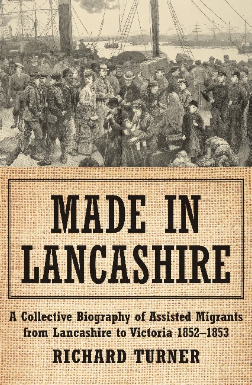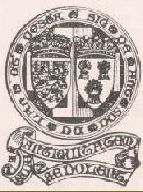
The Lancashire and Cheshire
Antiquarian Society
Founded 1883
Charity Registration No 1105708

Lancaster in the Great War (Towns and cities in the Great War Series)
John Fidler
116 pp. Pen & Sword Books, 2016. Paperback £9.99 (Kindle and ePub versions £5.99) ISBN 9781473846111
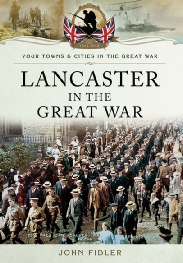
Although Lancaster was the ancient County town, it had a population of only 40,000 in 1914. Of these, it is thought that some 5,000 men saw war service between 1914-
Some 3,000 men had volunteered by December 1914, to join those already serving. While the depot of the King’s Own Royal Lancaster Regiment was in the town, about eighty regiments had Lancaster men in their ranks, and both the casualty lists and the awards for gallantry reflect this.
The town was out of range for shelling from the sea, or aerial bombardment, but did experience an explosion at its munitions factory in 1917. Apart from this, the mayor and council endeavoured to continue with their primary duties as far as possible in running the town.
A review of this book was published in Transactions vol. 110
Angel Meadow: Victorian Britain’s Most Savage Slum
Dean Kirby
196 pp. Pen & Sword Books Ltd, 2016. ISBN 9781783831524, paperback £14.99.
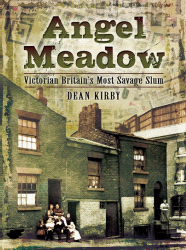 Angel Meadow: an innocuous name for an iniquitous area. Dean Kirby details the origin of the name and relates many astonishing, but accurately-
Angel Meadow: an innocuous name for an iniquitous area. Dean Kirby details the origin of the name and relates many astonishing, but accurately-
'Step into the Victorian underworld of Angel Meadow, the vilest and dangerous slum of the Industrial Revolution. In the shadow of the world's first cotton Mill, 30,000 souls trapped by poverty are fighting for survival as the British Empire is built upon their backs.'
Special offer: available to our members at 25% discount, with free postage in the UK! Just ring the publisher on 01226 734222 or use their website checkout and enter the voucher code 668712.
A review of this book was published in Transactions vol. 110
The Irish in Manchester c.1750-
Mervyn Busteed
286pp. Manchester University Press, 2016. ISBN 9780719087196; hardback £75.
Mervyn Busteed examines the ways in which Irish immigrants to nineteenth-
A review of this book was published in Transactions vol. 110
Blitz Britain: Manchester and Salford
Graham Phythian
The History Press, 2015. ISBN: 9780750961578; £12.99
In 1940, the Manchester and Salford Blitz saw the city and its surroundings targeted by the German Luftwaffe. The most destructive attack was launched in late December 1940; it is remembered today as ‘the Christmas Blitz’. Nearly 800 people lost their lives, and thousands more were injured, in two nights of raids ending with a devastating Christmas Eve that saw hundreds of tons of high explosive and thousands of incendiaries fall. Attacks continued into 1941 and beyond, and landmarks such as the cathedral, the Free Trade Hall, the Royal Infirmary and the Royal Exchange were all to suffer.
Manchester: The Making of the Modern City
Edited by Alan Kidd and Terry Wyke
Liverpool University Press, June 2016. ISBN: 9781846318788; paperback £14.99. 9781846318771 hardback £35.00
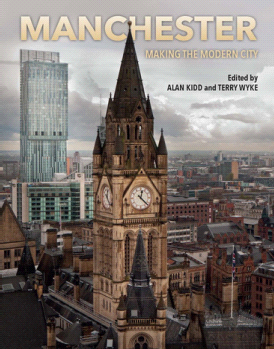 This book is available at a generous discount from the publisher: £10.00 paperback and £30 hardback (plus P&P). Just fill in this order form.
This book is available at a generous discount from the publisher: £10.00 paperback and £30 hardback (plus P&P). Just fill in this order form.
Every town and city has its story, but few have a history that is essential to understanding how the modern world was made. Manchester was the first industrial city and arguably the first modern city. During the industrial revolution it became the centre of the world's trade in cotton goods, so associated with that product that it was known as ‘Cottonopolis’.
In the nineteenth century Manchester was recognised across the globe as a symbol of industrialism and modernity. It was one of those iconic cities that came to stand for something more than itself. Its global reach stretched beyond industrialism as such and encompassed the political and economic ideas that the industrial revolution spawned. Manchester was simultaneously the home of the capitalist ideology of Free Trade (famously naming its chief public building in honour of this idea) and the place where Marx and Engels plotted the communist revolution.
The history of modern Manchester opens doors to an understanding of how science helped shape the modern world from the discoveries of Dalton and Joule to Rutherford’s splitting of the atom, the first stored-
Over time the population growth in and around Manchester generated an urban sprawl that became a city region. ‘Greater Manchester’ has been a reality for over a century and along with Greater London is the only metropolitan region to be named after its core city. As the industrial base on which the city and region had depended for two centuries collapsed in the later twentieth century the city had to take a new path. This it has done with remarkable success and twenty-
Appreciating how this has happened is as much a key to understanding Manchester as is knowledge of its past greatness. Written by leading experts on the history of the city and with numerous insights and unexpected stories, this profusely illustrated book is essential for an understanding of what Manchester has been and what it can become.
A review of this book was published in Transactions vol. 110
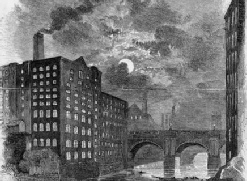
NON-SOCIETY PUBLICATIONS
SPECIAL OFFER TO OUR MEMBERS AND GUESTS
Reduced from £26.99 to £20.00. All you need to do is click on the link and to enter the code LANCS21 when you reach the checkout on the Gazelle website
Michael Powell and Terry Wyke, eds., A Bread and Cheese Bookseller: The Recollections of James Weatherley. Chetham Society, 2021, vol 55. £39.95.
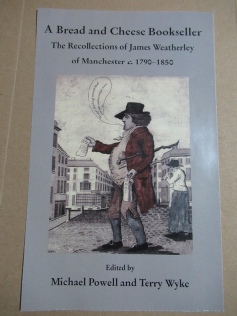 There is no reason why we should ever have heard of James Weatherley. Like the vast majority of the poor who lived during the industrial revolution, he should have left only the smallest of footprints in the historical record. He was born in Salford workhouse in 1794 and, 66 years later, would have suffered the public shame of a pauper’s funeral had it not been for the kindness of friends. Weatherley lived in Manchester all of his life, spending many of those years selling second-
There is no reason why we should ever have heard of James Weatherley. Like the vast majority of the poor who lived during the industrial revolution, he should have left only the smallest of footprints in the historical record. He was born in Salford workhouse in 1794 and, 66 years later, would have suffered the public shame of a pauper’s funeral had it not been for the kindness of friends. Weatherley lived in Manchester all of his life, spending many of those years selling second-
Shortly before his death he was persuaded to write an account of his life. The manuscript was acquired by Chetham’s Library in the 1880s where it has remained unopened and forgotten. It provides one of the very few first-
Weatherley, who began working in the cotton factories when a child, was to witness Manchester transformed from a small market town into the ‘the city of tall chimneys’ – a place of extremes that appalled and fascinated observers. When trade was slack in the mills, Weatherley made money by selling Eccles cakes on the streets. Aged 17, he left the mills, having decided to try to make his living selling books on the street. It was to prove a hard and precarious life, but one which was to bring him into contact with the lower reaches of the book trade and its customers -
Fortunately, Jem Weatherley was possessed of an exceptional memory, able to recall the details of not only those who had cheated him out of pennies but also those wider events such as the Peterloo Massacre and other protests that came to define Manchester’s history in the first half of the nineteenth century.
Weatherley is a unique voice. His recollections provide a view of history from the gutter rather than simply history from below.
This new volume edited by the late Michael Powell and Terry Wyke provides the full text of Weatherley’s manuscript.
Michael Powell, Librarian of Chetham’s Library, published on local history, the book trade and bibliography of the Manchester region. He was an active member and supporter of many local societies, including the Chetham Society and the Lancashire and Cheshire Antiquarian Society. He died in 2019.
Terry Wyke taught social and economic history at Manchester Metropolitan University, retiring in 2016. His publications focus on the Manchester region including its bibliography, the cotton industry and public monuments. He was a founder editor of the Manchester Region History Review.
To order copies: www.chethamsociety.org.uk
Lancashire Studies: Historical essays in honour of Alan Crosby
Many Lancashire and Cheshire Antiquarian Society members will know Dr. Alan Crosby well. An unfailingly interesting speaker in a wide range of Lancashire history topics, he has visited societies all across the historic county over a period of many years, The Lancashire Local History Federation has published a volume of historical essays in honour of Alan's 65th birthday. Released early in August, it includes contributions on a number of Alan's favourite topics in Lancashire history together with a biographical introduction, and it is available for purchase from the Federation..
The Age of Machinery: Engineering the Industrial Revolution, 1770-
Gillian Cookson
337 pp. Boydell and Brewer, £19.99 paperback. ISBN: 9781783272761
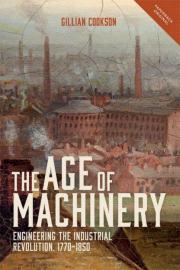 The engineers who built the first generations of modern textile machines, between 1770 and 1850, pushed at the boundaries of possibility. This book investigates these pioneering machine-
The engineers who built the first generations of modern textile machines, between 1770 and 1850, pushed at the boundaries of possibility. This book investigates these pioneering machine-
A review of this book was published in Transactions vol. 111.
Manufacturing the Cloth of the World: Weaving Mills in Lancashire
280pp. Published by the author, £21 paperback.
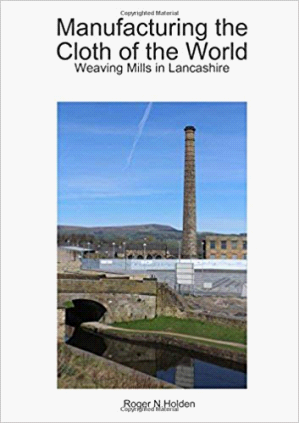 This well illustrated book is the first comprehensive study of the weaving sector of the Lancashire cotton industry to be published. The focus is on the development of weaving mills against the background of the economic development and organisation of the industry. Hand loom weaving was carried out in domestic premises or small workshops. Early power looms were installed in multi-
This well illustrated book is the first comprehensive study of the weaving sector of the Lancashire cotton industry to be published. The focus is on the development of weaving mills against the background of the economic development and organisation of the industry. Hand loom weaving was carried out in domestic premises or small workshops. Early power looms were installed in multi-
Published in conjunction with this title are Chadderton Mill and Palmer Mills, by the same author. All three books were reviewed in Transactions vol. 111.
Manchester’s Radical Mayor Abel Heywood: The man who built the Town Hall
Joanna M. Williams
256 pp. The History Press, £14.99 paperback, ISBN: 9780750984089
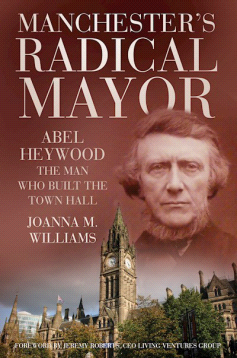 Known in his day as the man who built the Town Hall, Abel Heywood was a leading Manchester publisher who entertained royalty at his home and twice became Mayor of Manchester. Yet before he found success his life was one of poverty and hardship, marked by a prison term in his pursuit of a free press. A campaigner for votes for all and social reform, Heywood attempted to enter Parliament twice, but his working-
Known in his day as the man who built the Town Hall, Abel Heywood was a leading Manchester publisher who entertained royalty at his home and twice became Mayor of Manchester. Yet before he found success his life was one of poverty and hardship, marked by a prison term in his pursuit of a free press. A campaigner for votes for all and social reform, Heywood attempted to enter Parliament twice, but his working-
This book was reviewed in Transactions vol. 111.
Revealing Cumbria's Past: 150 Years of the Cumberland and Westmorland Antiquarian and Archaeological Society
Michael Winstanley (Editor)
368 pp. CWAAS, £15 paperback. ISBN: 9781873124734
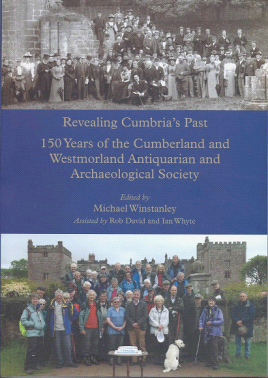
Based on a detailed investigation of local sources, this book examines the history of the landed estate system in England since the mid-
Social and environmental implications of the landed system as a whole are discussed and particular attention is paid to the nineteenth-
This book was reviewed in Transactions vol. 111.
Landed Estates and Rural Inequality in English History From the Mid-
Eric L. Jones
129 pp. Palgrave Studies in Economic History 2018 £44.99 hardback, ISBN: 9783319748689
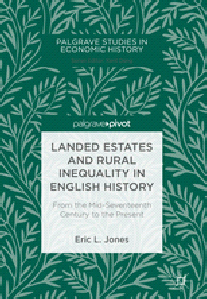 Based on a detailed investigation of local sources, this book examines the history of the landed estate system in England since the mid-
Based on a detailed investigation of local sources, this book examines the history of the landed estate system in England since the mid-
Social and environmental implications of the landed system as a whole are discussed and particular attention is paid to the nineteenth-
This book was reviewed in Transactions vol. 111.
James Buckley's Cash-
Jim Sutton (Editor)
210 pp. The Record Society of Lancashire and Cheshire, 2017, £14.50 hardback. ISBN:9780993573118
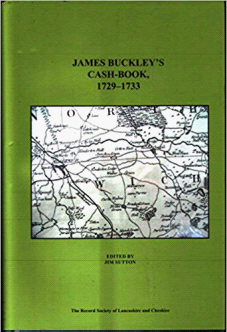 James Buckley's cash book from 1729 to 1733 has been published as Volume 154 of the Society's texts. Buckley was a land agent and surveyor and a trustee of Cranage Forge near Knutsford and the records which are published are his detailed accounts of all the money he received and expended throughout the four years. They include matters concerning the business of the forge and also Buckley's private affairs and those of his associates and family. The cash book sheds light on the development of the iron industry in the area, and also on the everyday lives of the local population Edited by Jim Sutton, the volume gives a fascinating look at the lives of an upwardly mobile man of business and his circle.The volume will be of particular interest to people interested in he following families, whose names are mentioned repeatedly in the cash book: Askham, Booth, Cotton, Hall, Kenerley, Leadbeater, Okell and Vawdry.
James Buckley's cash book from 1729 to 1733 has been published as Volume 154 of the Society's texts. Buckley was a land agent and surveyor and a trustee of Cranage Forge near Knutsford and the records which are published are his detailed accounts of all the money he received and expended throughout the four years. They include matters concerning the business of the forge and also Buckley's private affairs and those of his associates and family. The cash book sheds light on the development of the iron industry in the area, and also on the everyday lives of the local population Edited by Jim Sutton, the volume gives a fascinating look at the lives of an upwardly mobile man of business and his circle.The volume will be of particular interest to people interested in he following families, whose names are mentioned repeatedly in the cash book: Askham, Booth, Cotton, Hall, Kenerley, Leadbeater, Okell and Vawdry.
This book was reviewed in Transactions vol. 111.
NEW SOCIETY PUBLICATIONS
Transactions of the Lancashire and Cheshire Antiquarian Society Volume 112
The volume of Transactions, no. 112 (for 2020), is available now. The main contents are:
Geoff Higgins, The Diary of John Lee of Marple 1818-
David Ratledge, Lancashire & Cheshire Roman Roads: A Second LiDAR Reassessment.
Derek Brumhead, John Potts (1791-
Derek Brumhead, Henry Edward Tidmarsh (1854-
D. C. Daniels, Corruption in Manchester Police 1890 – 1900, The Dugdale Inquiry and Superintendent Bannister: ‘a bad bold man’.
Andrew Abram, The Influence of Military Professionals and Trained Band Officers in Lancashire and Cheshire during the British Civil Wars.
Rowan Patel, Thornton Grange: A Wirral Grange of Basingwerk Abbey.
Oliver Cook and Ian Miller, Settlement, Land-
Andrew W. Lamb, An Iron Age Torc from Burnley, Lancashire.
